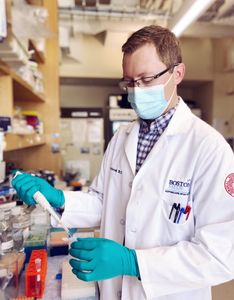Basic Science and Translational Research

Research is an essential aspect of our work at Boston University Chobanian & Avedisian School of Medicine and Boston Medical Center (BMC). The Department of Surgery is committed to advancing care through surgical research. We pursue initiatives that support all aspects of biomedical research, from explorations at the basic science level, to translating fundamental discoveries into treatments that improve human health. These pursuits are vital to the education, training, and development of our students, residents, fellows, and physician-scientists.
Conducted in environments that cultivate scientific inquiry within the traditional surgical disciplines as well as across disciplinary boundaries, our aim is to foster multidisciplinary research, not only within the Department of Surgery but also with investigators from other departments, such as Biomedical Engineering. These activities are critical to translating breakthroughs in basic science to the bedside, and beyond, using novel treatment modalities for the betterment of patients.
Our students, residents, and faculty participate in various labs and affiliated organizations. Below are a few examples of basic science research with a translational focus being performed within the department.
Senescence & Delayed Wound Healing
Through his research, plastic surgeon Daniel Roh, MD, PhD aims to improve the health and quality of life of patients affected by wounds and scars. His research interests include the role of senescence (the stress-response mechanism by which cells in the body undergo permanent growth arrest without dying) in delayed wound healing as individuals age; acute wound healing processes; chronic wounds such as venous ulcers, pressure ulcers, and diabetic ulcers; and pathologic cutaneous scarring. As the U.S. population skews older, the relevance of Dr. Roh’s research on senescence is clear, and he has been funded by the NIH and private foundations. In 2023, Dr. Roh received the Paul B. Beeson Emerging Leaders Career Development Award in Aging, a five-year $1.2 million grant, from the National Institute on Aging (NIA) to fund his project, “Targeting Senescence to Improve Wound Healing in Aging.” In addition, Dr. Roh is co-principal investigator (PI) of a four-year, $2 million grant awarded in 2024 by the Hevolution Foundation, which has previously supported his research. Together with co-PI Jeroen Eyckmans, PhD, research assistant professor in Boston University’s College of Engineering, he is investigating the impact of the extracellular matrix (ECM) on impaired wound healing in aging. By utilizing bioengineered microtissues from Dr. Eyckmans’ lab and employing CRISPR gene editing in aging mouse models, they aim to manipulate the wound ECM to enhance injury resiliency and accelerate tissue repair in aging. Dr. Roh has previously been principal investigator (PI) of a Boston Claude D. Pepper Older Americans Independence Center Research
Education Core Award and the PI of an NIA R03 GEMSSTAR Award.
Acute & Chronic Pancreatitis
Andrea Geisz, PhD, MS, is engaged in research to unravel the mechanisms underlying the trigger for pancreatitis—premature activation within the pancreas of trypsinogen to trypsin, the main digestive enzyme. An initial acute attack can be followed by recurrent acute episodes and eventual progression to chronic disease. The unmet need is high, as pancreatitis is still poorly understood, with no specific therapy or cure. Dr. Geisz is recognized for her contributions in creating novel genetically engineered mouse models of chronic pancreatitis, an important achievement not only in advancing the understanding of the pathomechanisms of pancreatitis but also in providing preclinical tools for testing potential therapeutics. She is currently supported by an R01 grant awarded in 2023 by the National Institute of Diabetes and Digestive and Kidney Diseases. Previous support has included a Department of Defense Discovery award, an American Pancreatic Association Young Investigator in Pancreatitis grant, and an American Gastroenterological Association Research Scholar award.
For more information about resources:
For a full listing of Core Laboratories & Facilities, please click here.
For further information on faculty research interests, click here.